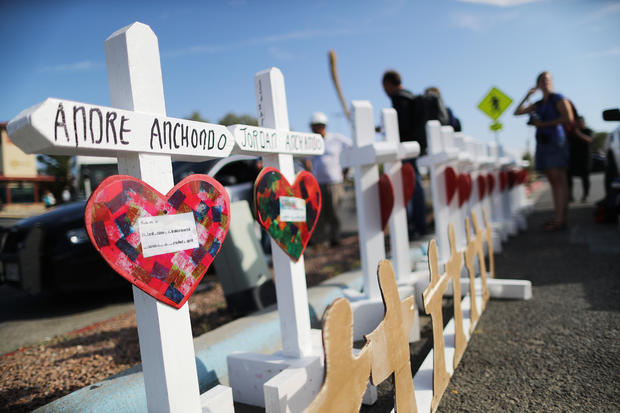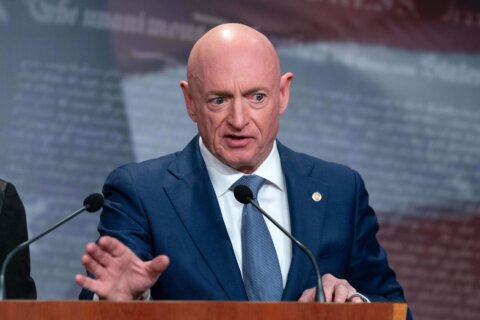▶ Watch Video: FBI reports 2019 was deadliest year on record for hate crimes
Hate crime murders surged to a record high in 2019 and overall hate crime incidents also rose, according to annual data released Monday by the FBI.
Data shows 51 people were the victims of murder or non-negligent manslaughter motivated by hate in 2019, far surpassing the 24 people killed the year before. According to the Anti-Defamation League, 2018 had already been the deadliest year on record for victims of hate crimes since the FBI began tracking the data in the early 1990s.
Last summer’s mass shooting at an El Paso, Texas, Walmart was the deadliest anti-Latino attack in modern U.S. history. The shooting suspect, who railed in a manifesto about a “Hispanic invasion of Texas,” is facing federal hate crime charges. In 2018, a gunman opened fire at the Tree of Life Synagogue in Pittsburgh, the deadliest anti-Semitic crime in U.S. history.
“When one individual is targeted by a hate crime, it hurts the whole community—that’s why people are feeling vulnerable and afraid,” ADL CEO Jonathan Greenblatt said in a statement.

Of 15,588 law enforcement agencies who provided data to the FBI in 2019, 2,172 reported 7,314 hate crime incidents involving 8,559 offenses, meaning some incidents involved multiple criminal charges or victims. The total incidents rose from 7,120 in 2018, a year in which hate crime incidents had declined slightly following three years of increases.
“What the stats show is that the numbers are really going in the wrong direction,” CBS News correspondent Jeff Pegues said, speaking on CBSN.
The ADL noted that the numbers increased despite two years of drops in the total number of law enforcement agencies who participate in the federal data collection program.
Most of the hate crime incidents reported by the FBI in 2019 — 7,103 — stemmed from a “singe bias,” rather than multiple biases. Of the “single-bias” incidents, the FBI said:
- 55.8% were motivated by bias against race, ethnicity or ancestry
- 21.4% were motivated by bias against religion
- 16.8% were motivated by bias against sexual orientation
- 2.8% were motivated by bias against gender identity
- 2.2% were motivated by bias against disability
- 1% were motivated by bias against gender
Race-based crimes have remained the most common type of hate crime in the nearly three decades the FBI has tracked the data, according to the ADL. Nearly half of race-based hate crime offenses in 2019, 48.4%, were anti-Black, the data show. Of hate crime offenses motivated by religious bias in 2019, 60.3% were anti-Jewish.
In 2019, anti-Jewish crimes rose 14% and anti-Hispanic crimes rose nearly 9%, the fourth year of increases, according to the ADL. Crimes motivated by bias against sexual orientation stayed about the same year to year, making up nearly 17% of single-bias incidents. Hate crimes motivated by gender-identity bias rose another 18% following a 41% increase in 2018. The Human Rights Campaign has said transgender women of color are most at risk for fatal violence, due to “a toxic mix of transphobia, racism and misogyny.”
“Yet another year with alarming levels of bias-motivated crimes underscores just how urgent it is to address this hate crimes epidemic,” Human Rights Campaign President Alphonso David said in a statement.
The proliferation of white supremacist ideology online combined with a culture of gun violence in the U.S. has resulted in some perpetrators of mass shootings targeting victims for their race, religion, or other protected characteristic, said Kami Chavis, professor of law and director of the criminal justice program at Wake Forest University.
Chavis said there’s been a lack of urgency to stem a growing threat of domestic terrorism in the U.S., including the threat from white supremacists, many of whom are radicalized through social media. In February, the FBI said it had elevated its assessment of the threat posed by racially-motivated violent extremists in the U.S. to a “national threat priority” for the 2020 fiscal year.
“There is an inextricable link between armed white supremacists and the increase in hate crimes, particularly deadly ones,” Chavis said.
Advocates including the League of United Latin American Citizens have blamed President Donald Trump for fueling racist rhetoric. “Today’s numbers from the FBI prove Latinos, Blacks, the Arab, Muslim and LGBTQ communities are among those wearing a target on their back every day in America,” said LULAC national president Domingo Garcia in a statement.
Hate crime prevention advocates caution that the data is likely widely under-reported, in part because the participation of local jurisdictions is voluntary. They point out a significant gap in the FBI’s data which came to light because two of the most notorious hate crimes in recent years were never reported to the government, even though they were prosecuted as hate crimes. The killing of Heather Heyer in the 2017 Charlottesville car attack as she protested the “Unite the Right” rally, and the fatal 2016 shooting of Khalid Jabara in Tulsa by a neighbor who had terrorized the victim’s Lebanese family, were both left out of national hate crime statistics collected by the FBI. Proposed legislation named for the victims, the Heather Heyer and Khalid Jabara NO HATE Act, would provide incentives for hate crime reporting and grants for state-run hate crime hotlines.
While victims can sometimes fear speaking up to report the incidents, law enforcement isn’t always properly trained to recognize hate crimes, adding to the reporting gap, said Nikki Singh, policy and advocacy manager for the Sikh Coalition. The group is advocating for the passage of the NO HATE Act, which would also provide training to local jurisdictions.
The Sikh Coalition, which fields reports of anti-Sikh hate incidents, was especially alarmed that each incident reported to them in 2019 included an element of violence, Singh said. “In general, we treat these reports as a tip of the iceberg situation,” Singh said. “We know from our work with the community the reality is actually much worse.”
Also crucial is to ensure hate crimes are appropriately prosecuted, Chavis said. State hate crime laws, which typically mandate enhanced sentencing for perpetrators of bias-motivated crimes, vary widely, and three states have none at all. The federal government also has the authority to bring charges under the Matthew Shepard and James Byrd Jr. Hate Crimes Prevention Act, which can act as an important “backstop” alongside the patchwork of state legislation, Chavis said.
“This increase underscores the importance of having vigorous enforcement of hate crime legislation, whether at the state level or federal level,” Chavis said.







